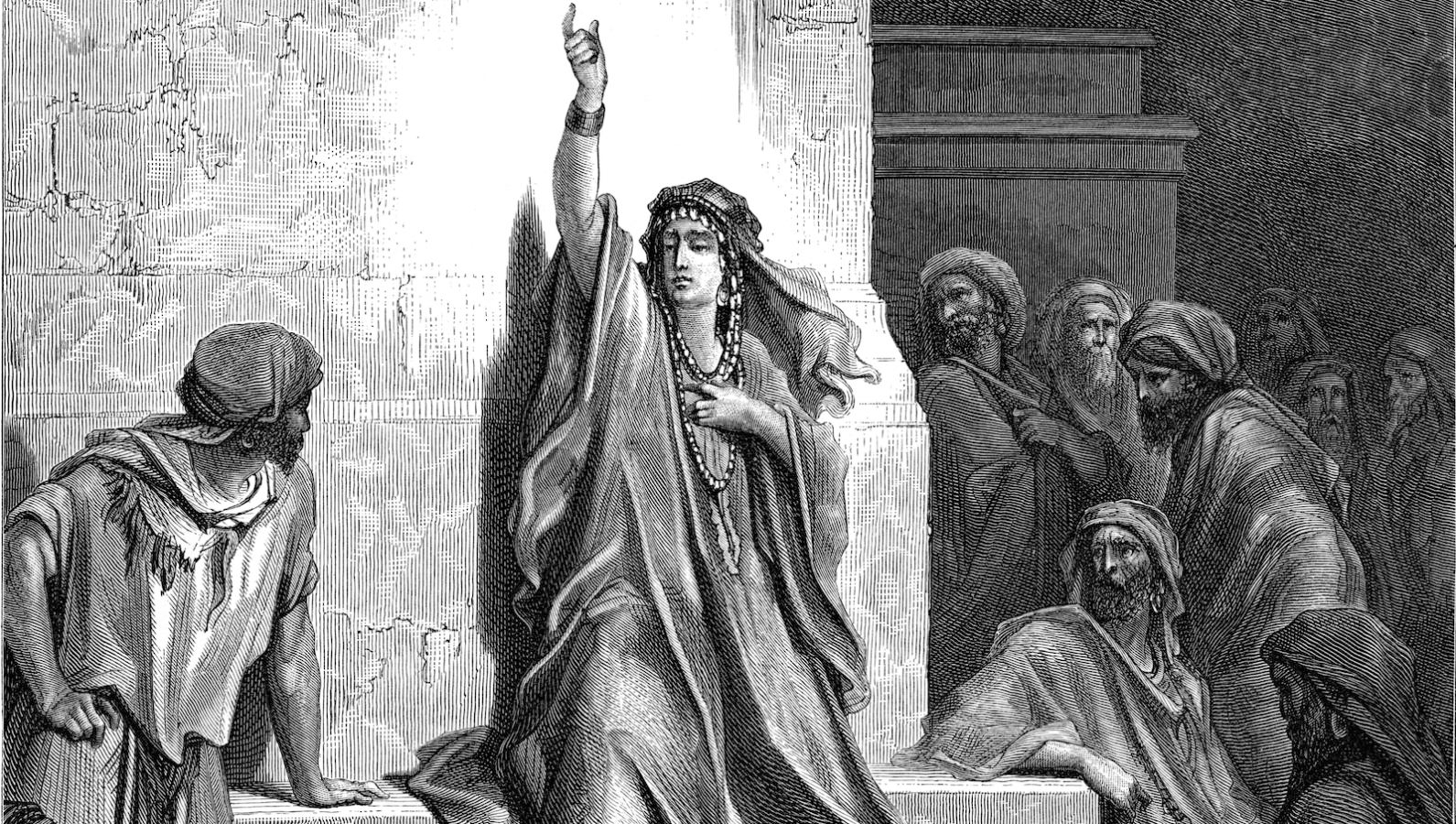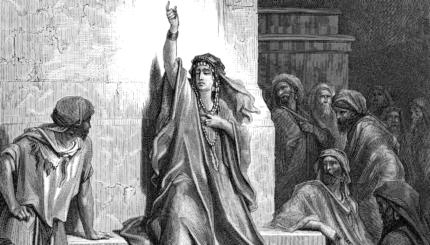Israel, crossing into Canaan, changes its role. It is a time of conquest, a time of war. The Israelites have become fighters, and the saviors of Israel — women as well as men —have to be aggressors. The times call for warriors, and two warrior women (Deborah and Yael) appear in the decisive defeat of the Canaanites. One, Deborah, initiates the battle, calling the troops to action and declaring the start of hostilities.
The story (of Deborah) is in Judges 4, and the song is in Judges 5. “The Song of Deborah” is a very ancient poem, one of the earliest writings that the Bible preserves: it was most probably written in the eleventh century, soon after the events it records.
The story reached its present shape much later in Israel’s history. The two literary creations have subtly different attitudes, and in placing them side by side, the historian of the book of Judges encourages the reader to read them together as well as separately.
Deborah, Prophet and Judge: Judges 4:4-5
“Deborah the prophetess —woman, Lapidot, woman — she judged Israel at that time.

Help us keep Jewish knowledge accessible to millions of people around the world.
Your donation to My Jewish Learning fuels endless journeys of Jewish discovery. With your help, My Jewish Learning can continue to provide nonstop opportunities for learning, connection and growth.
“She would sit under ‘Deborah’s Palm Tree’ between Ramah and Beth-El on Mount Ephraim, and the Israelites went up to her for judgment.”
Prophet and “Lapidot-woman”
The record begins as Israel is oppressed by Yavin king of Hazor. Deborah is a prophet-woman, someone who speaks with divine authority, and she is Lapidot-woman. Eshet lapidot could be translated “wife of Lapidot,” but it also means “woman of torches.” Lapidot, “torches,” comes where we would ordinarily expect a husband’s name, but it is a strange-sounding name for a man and, moreover, does not have the standard patronymic “son of.”
The reader must decide whether to translate lapidot as a name or a noun. Translating it “wife of Lapidot” has the advantage of emphasizing that a prophet could be married and that a married woman could have another role.
On the other hand, “woman of torches” or “fiery woman” fits the image of Deborah and would fit the story in the manner of biblical names. “Torch-Lady” provides a significant wordplay, for it is Deborah, not her husband, who is the torch that sets the general Barak (whose name means “lightning”) on fire.
Moreover, in Mesopotamian mythology, the torch and the lightning (tsullat and hanish) are the heralds of the storm god. In the same way, “Torch Lady” and “Lightning” are fit agents for the God of Israel, who defeats Sisera by creating a river of mud to incapacitate his chariots.
Deborah the Judge
The story also tells us that Deborah judged Israel. The “judges” were Israel’s charismatic leaders in the days before the monarchy. These leaders usually acquired their political authority after they saved Israel through battle. The first such judge, Othniel ben Kenaz, set the pattern: the oppressed people cried out to God, “the spirit of YHWH came upon him (Othniel), he judged Israel and went out to battle, and YHWH gave Cushan Rishatayim king of Aram into his hand” (Judges 3:10).
Did Deborah become a judge in the same way, by leading a group in battle? Or perhaps she acquired her authority by offering sage advice that led to a victory, or by predicting an important matter that came true. The story never tells us.
In the “Song”, Deborah describes a total breakdown of order in Israel. Wayfarers had to go by roundabout ways to avoid danger; in those days there was no rescue “Until I arose, Deborah, until I arose, a mother in Israel (Judges 5:7)”. Somehow Deborah imposed order on Israel. How this happened, neither the poem nor the story records. Their silence on such important matters is a reminder that neither the story nor the Song was framed as a record of Deborah’s life.
One day, Deborah called Barak: Judges 4:6-10
She sent and called for Barak ben Avinoam from Qedesh-Naftali.
She said to him, ‘Did not YHWH God of Israel command: “Go and pull toward Mount Tabor and take with you ten thousand men from the men of Naphtali and Zebulun. I will draw Sisera the head of Yavin’s army and his chariotry and masses to Wadi Kishon and I will give him into your hand.
Barak said to her, ‘If you go with me, I will go. if you will not go with me, I will not go.’
She said, ‘I will indeed go with you, especially since you will get no glory on the way you are going, for into the hand of a woman YHWH will deliver Sisera.’
Deborah rose and went with Barak to Qedesh.
Barak mustered Zebulun and Naphtali to Qedesh.
Ten thousand men went up at his feet, and Deborah went up with him.
What prompted Deborah to call Barak? Perhaps the people initiated the call. The people not only regularly went to her for decisions, they came to her one day for a particular kind of “judgment.” The poem provides a hint as to what they wanted: “Then the people of YHWH went down to the gates: ‘Awake, awake, Deborah. Awake, awake, speak a song. Arise, Barak, take your captives, son of Avinoam'” (Judges 5:12). This anguished outcry may have impelled Deborah to begin the redemption.
Deborah calls Barak in her role as a prophet, an envoy of God. Moreover, Deborah hints that she is following up on a previous call to Barak: Did not YHWH God of Israel command? God has spoken to Barak, and Deborah’s call is a second summons. Barak is reluctant to go, like Moses before him, like Gideon and Samuel later in Israel’s history, others called by God to be envoys. He seeks assurance that God is really with him and insists that Deborah go with him to the battle staging area where the warriors assemble.
Is It “Weak” of Barak to Need Deborah?
Readers have often been bothered by Barak’s reluctance to go without Deborah, declaring that his hesitation makes him “less manly” or tarnishes his glory. But Barak has good reason to be insecure: Yavin, after all, has nine hundred chariots! Moreover, prophets play several roles in battle: they muster and inspire the troops, and also declare the correct, auspicious time to begin. Prophets are such an important presence in battle that Elijah and Elisha are called “Israel’s chariot and cavalry.”
Female Prophets, Women at War
Many readers of this story have been particularly troubled by the presence of women in war, believing that they are somehow out of place there and assuming that ancient Israelites would have felt the same way. But most of the Assyrian prophets were women, and reports from both the ancient and more recent Near East show a consistent pattern of the presence of women to inspire the troops and taunt the enemy. There is no reason to think that biblical readers found anything strange about Barak’s request to Deborah, as either prophet or woman.
The Battle: Judges 4:13-16
Sisera mustered all his chariotry, nine hundred iron chariots, and all his people from Harosheth-Hagoyim to Wadi Kishon.
Deborah said to Barak, ‘Arise, for this is the day that YHWH gives Sisera into your hand. Does not YHWH go out before you?’
Barak quickly descended from Mount Tabor and ten thousand men after him.
YHWH distressed Sisera and all the chariotry and all the camp by the sword before Barak and Sisera descended from his chariot and fled on foot.
Barak chased the chariots and the camp to Harosheth-Hagoyim and fell on Sisera’s camp with the sword. Not even one remained.
Deborah’s Weapon, the Word, Shows God as Israel’s True Savior
On Mount Tabor, Deborah the prophet announces the victory. She herself does not go down to the battle. Like Moses, Deborah is not a battle commander. Her role is to inspire, predict, and celebrate in song. Her weapon is the word, and her very name is an anagram of “she spoke” (dibberah). The battle itself is not essential. It is important only to remember that God fought: God distressed Sisera. Deborah has announced God’s victory, Barak has facilitated it, and God has saved Israel. The Song of Deborah provides a glimpse of how God defeated Canaan: God brought a flash flood that made a bog of sliding mud in which chariots were useless.
A Woman and Mother, Neither Hidden nor Incidental
Both the story and the song emphasize the fact that Deborah is a woman. The story tells us that she was a prophetess-woman, adding the word “woman,” ishah, when the female noun “prophetess,” nebi’ah, already conveys that information. She is called “Lapidot”-woman or Lapidot’s woman, again repeating the word “woman,” eshet.
And the song stresses that Deborah was a “mother in Israel.” The femaleness is neither hidden nor incidental: it is an integral part of the story. The motherhood of this “mother in Israel” goes beyond biology. It describes her role as counselor during the days before the war, and it indicates her role in preserving the heritage of Israel, in her case by advising in battle.
The fullest sense of Deborah as mother is revealed in her name, which is not only an anagram of “she spoke”; it is also a noun meaning “bee.” Like the queen bee, she raises up the swarm for battle, sending out the drones to protect the hive and conquer new territory.
Excerpted from Reading the Women of the Bible and used with the permission of Schocken Press.



